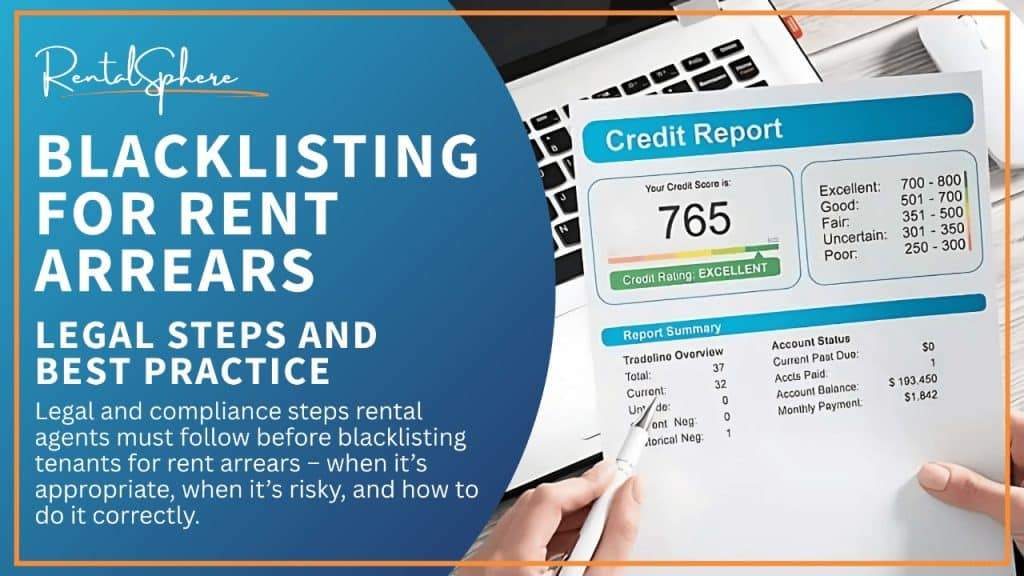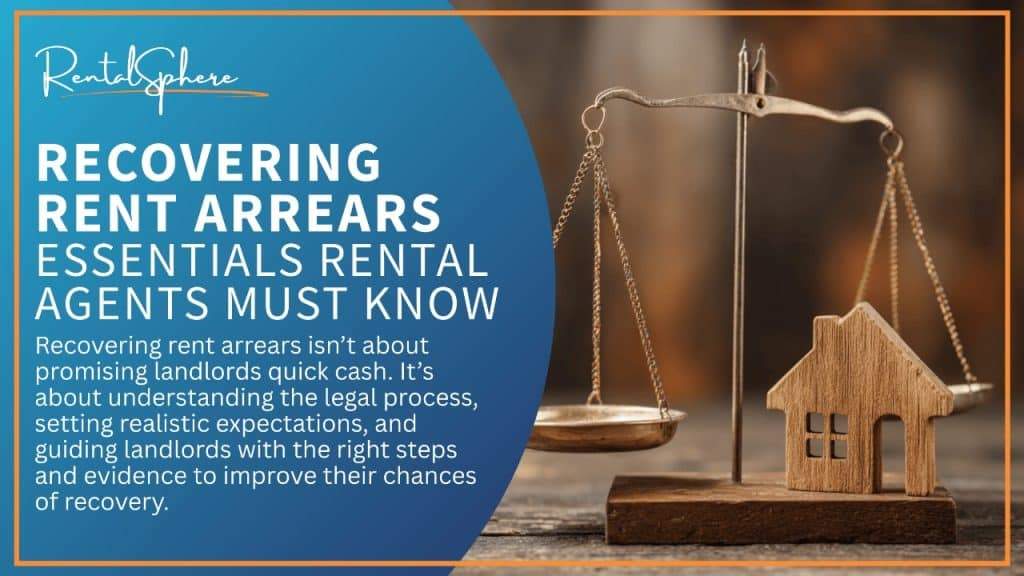Blacklisting for Rent Arrears – Legal Steps and Best Practice
Blacklisting for rent arrears is possible, but only if strict compliance steps are followed. Learn when, how, and why to use it responsibly as a rental professional. This article is based on a members-only RentalSphere Inner Circle webinar with Elize le Roux, CEO of Xpello.
📩 Get new articles delivered directly to your inbox
Join 2,400+ rental pros who get smarter with tips, guides, compliance updates & more delivered straight to their inbox.
Blacklisting for rent arrears is a common issue landlords raise with their rental agents — often phrased as, “Can we blacklist them?”
As rental agents, our role is not only to carry out a landlord’s instructions, but also to provide clear, accurate advice. Blacklisting for rent arrears — also known as an adverse credit listing — is one option. But the timing is critical. If done at the wrong time, it can backfire badly. There are also strict legal requirements, and failure to comply can leave the landlord exposed to disputes or wasted time.
What Blacklisting for Rent Arrears Really Means
Blacklisting for rent arrears means reporting unpaid rental debt to a credit bureau. Once listed, the tenant’s credit profile shows the default, making it harder for them to obtain loans, open accounts, or rent another property.
It’s important to stress to landlords that blacklisting:
- ❌ Does not recover money. It won’t put arrears back in the landlord’s account. (Recovering arrears requires other legal processes, covered in a separate article.)
- ✅ Acts as a deterrent. Tenants may pay up to clear their credit record.
- ✅ Protects others. It warns future landlords and creditors of the tenant’s poor payment history.
- ⚠️ May keep the tenant in place. If you blacklist while the tenant still occupies the property, they may struggle to secure new accommodation — leaving the landlord stuck with a defaulting tenant longer.
The Legal Requirements for Blacklisting for Rent Arrears
During a RentalSphere Inner Circle webinar, our expert guest Elize le Roux (CEO of Xpello — one of our valued partners) explained the compliance conditions that must be met before a landlord or agent can legally blacklist a tenant. Inner Circle members also enjoy discounted rates with Xpello as part of their membership benefits. These include:
- Three consecutive missed payments. A single missed month is not enough.
- Three consecutive Letters of Demand (LODs). Each must be sent after non-payment, allowing 20 business days to remedy.
- Explicit warning in each LOD. Every notice must state clearly that non-payment will result in blacklisting with a credit bureau.
Only once all three conditions are satisfied, and the tenant has still not paid, can blacklisting proceed. Skipping any step risks the listing being challenged and removed.
When Not to Use Blacklisting for Rent Arrears
There are situations where blacklisting for rent arrears is premature or risky:
- Tenant still in the property. Blacklisting should not be used as a pressure tactic. It is a post-default remedy, not a rent collection tool.
- No proper paper trail. If LODs were not sent correctly, or lacked warnings, the listing may be overturned.
- Disputed arrears. If there’s a disagreement about what is owed, blacklisting may be considered unfair or unlawful.
One member shared in the webinar that after blacklisting an ex-tenant, the tenant disputed it — and they had to prove the process was followed correctly. Without proof, the listing could have been cancelled.
When Blacklisting for Rent Arrears Makes Sense
In other cases, blacklisting for rent arrears can be appropriate and helpful:
- Tenant absconds. If the tenant leaves owing several months’ rent, blacklisting may be the only effective consequence.
- Broken payment plan. If the tenant defaults on an agreed instalment plan, blacklisting reinforces accountability.
- Alternative to judgment. Court judgments are automatically registered with credit bureaus, but the legal process is costly and slow. Blacklisting offers a faster way to reflect arrears on a tenant’s record without pursuing judgment.
Guiding Landlords: Setting Expectations
For landlords, blacklisting for rent arrears often feels like the easiest solution. Agents should manage expectations by explaining that:
- It is a compliance-heavy process. It takes time and proper documentation; you cannot rush it.
- It does not guarantee payment. At best, arrears are recovered later if the tenant wants to clear their record. In such cases, the landlord or agent can require full settlement before granting removal.
- It is about accountability, not cashflow. Blacklisting is designed to protect the credit system and warn others, not to put money back in the landlord’s account immediately.
Handled properly, blacklisting for rent arrears upholds professional standards and provides long-term protection. Mishandled, it creates disputes, delays, and reputational risk.
FAQs on Blacklisting for Rent Arrears
Can you blacklist for rent arrears while the tenant still lives in the property?
Generally not advised. It is a post-default remedy and can trap the landlord with a non-paying occupant.
What proof is needed to blacklist for rent arrears?
Evidence of three consecutive missed payments and three compliant 20-business-day LODs with explicit blacklisting warnings.
Does blacklisting for rent arrears recover money?
No. It is a tool of leverage and accountability, not direct collection.
✅ Note: This article is based on a members-only RentalSphere Inner Circle webinar (Episode 2516) with our expert guest Elize le Roux, CEO of Xpello. Inner Circle members can access the full replay and extended Q&A for practical examples and detailed compliance guidance.
👉 Not yet a member? Click here to find out more and join — you’ll get immediate access to the replay of this episode, as well as all previous episodes.
About Xpello
One of the reasons that Xpello is one of our favourite partners is that they take the “heavy-lifting” off agents when breaches (including arrears) have occurred. The management of the breach process is transferred to the experts — and the results speak for themselves: 98% of breaches referred to Xpello are resolved without needing an eviction!
🔥 Do you want to be top of your rental game?
Then the RentalSphere Inner Circle is where you belong!
- Exclusive monthly live training with rental experts
- Access to all past recordings & resources
- A monthly pre-written landlord newsletter
- Access to our expert partners at member-only rates
- WhatsApp support whenever you need it
💬 Rental Pro Hub on WhatsApp
600+ rental professionals already get:
📰 Articles & industry news
💡 Expert rental advice
🎟️ Training invites
✅ Admin-only messages = no noise, no spam.
RentalSphere — we FOCUS on #RentalMatters because #RentalsMatter.



